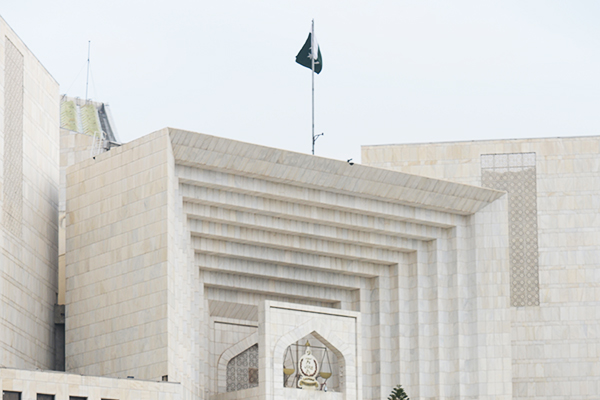
Farooq Naeem—AFP
Nearly 16,000 employees had been dismissed from service on Aug. 18 after apex court ruled as ‘illegal’ a 2010 law that had granted them jobs, promotions
The Supreme Court of Pakistan on Friday reinstated thousands of government employees that had been dismissed from service on Aug. 17 by a court ruling against the law that had granted them employment.
On Aug. 17, Justice Mushir Alam had declared as illegal and unconstitutional the Sacked Employees (Reinstatement) Ordinance Act 2010, under which the then-PPP government had ensured thousands had been granted employment or promotions. In its ruling this week, a five-member bench—with a majority of four against one—dismissed petitions seeking a review of the Aug. 17 judgment and reinstated the government employees with conditions.
In a short order, announced by Justice Umar Ata Bandial, the court held the Sacked Employees (Reinstatement) Act, 2010 to be in violation of Articles 25 (equality of citizens), 18 (ensuring freedom of trade, business or profession), 9 (security of person) and 4 (rights of individuals to be dealt with in accordance with the law) of the Constitution. “Thus the SERA is void under Article 8 (laws inconsistent with or in derogation of the fundamental rights to be void),” it read.
The court said that the employees who were initially dismissed from Nov. 1, 1996 to Oct. 12, 1999 would be considered reinstated to their posts from Aug. 17 on the same terms and conditions of service as their original contracts. It said they also did not require any aptitude, scholastic or skill test for their appointment. Similarly, it said that employees who required completion of any aptitude, scholastic or skill test for appointment would also be reinstated from Aug. 17 on the terms and conditions of service that were applicable on the date of their termination.
However, the judgment noted, any improvement in the terms and conditions of service of all the reinstated employees would proceed strictly in accordance with laws and rules. It also stressed that no employees that had been sacked for absence from duty, misconduct, corruption, misappropriation of money/stock or unfitness on medical grounds would be reinstated without separate court petitions.
Meanwhile, sole dissenter Justice Syed Mansoor Ali Shah maintained that parliamentary sovereignty or legislative supremacy was the cornerstone of a strong democracy. “We must, therefore, recognize the central role of the legislature,” he wrote, stressing that undermining legislature undermined democracy. Noting that under Article 8 of the Constitution, any law enacted by the legislature was void only to the extent it took away or abridged fundamental rights of the people, he said Sections 4(a) and 10 of the SERA were unconstitutional to the extent of reinstatement and regularization of sacked employees on “one scale higher.” This, he wrote, gave an undue advantage to reinstated employees to the detriment of the rights of the already working regular employees.
The judgment was met with jubilation outside the apex court, as dozens of sacked employees and their families ended a sit-in organized to await the verdict.
